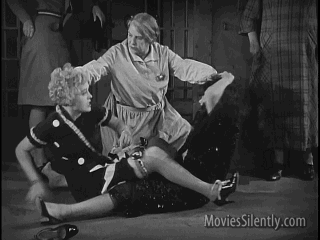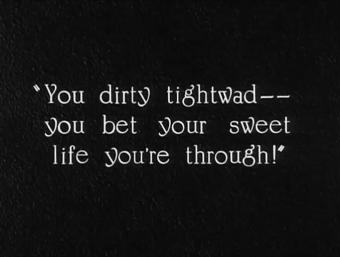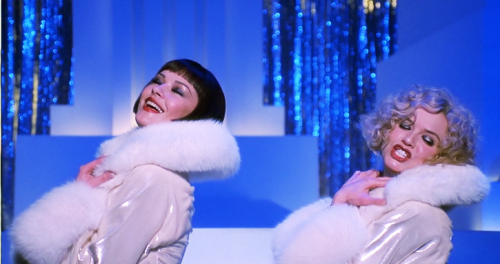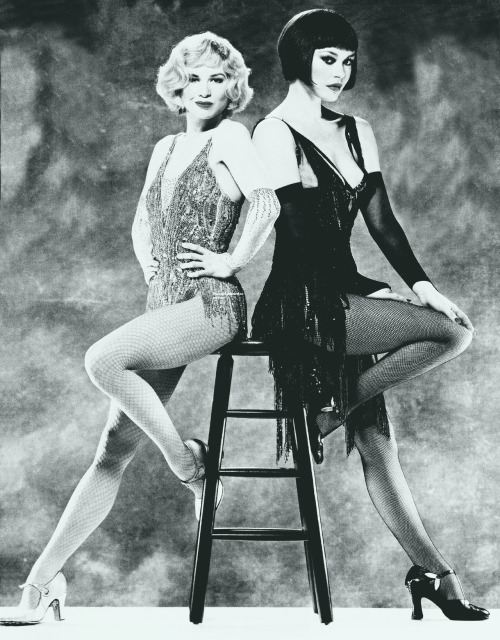O tema era amizade. Dezenas de filmes passaram
pela minha cabeça. Todos com algo em comum: eram sobre amizade entre homens. Há
muitos filmes sobre “bromances”, camaradas,
grupos de homens cultivando a amizade. E há poucos clássicos sobre amizade
entre mulheres, sendo “Os Homens Preferem as Loiras” (1953) o mais conhecido
deles. Quando duas mulheres são colocadas lado a lado, com a mesma importância,
em geral elas são rivais no amor, e não amigas.
Será que só Lorelei e Dorothy conseguiram ser amigas num filme clássico?
The subject was friendship. I could think of dozens of
movies. All of them with one thing in common: they were about friendship
between men. There are a lot of films about bromances, camaraderie, groups of
men who are good friends. And there are few classic films about friendship
between women, and “Gentlemen Prefers Blondes” (1953) is the best known of them
all. When two women are put side by side, with the same importance, in general
they are rivals, not friends. Were Lorelei and Dorothy the only two girl pals
in classic film?
Havia muitas duplas ou trios de amigas na era pre-Code, mas uma sempre se sobressaía e
a outra ficava como alívio cômico, de lado, às vezes até esquecida ao longo do
filme. É isso que acontece, por exemplo, em “Três... Ainda é Bom” (1932), com a
personagem de Ann Dvorak ganhando destaque em detrimento das amigas Bette
Davis, a moça simples, e Joan Blondell, a amiga bem-humorada.
There were a lot of female duos and trios in the
pre-Code era, but one of them was the lead and the other was only comic relief
and could be forgotten as the movie progressed. This happens, for instance, in“ Three on a Match” (1932), with Ann Dvorak’s character being the lead and his other
two girl friends, Bette Davis, the simple girl, and Joan Blondell, the
wisecrack friend, being left behind.
Não há poucos filmes sobre amizade feminina
porque não havia amizades femininas inspiradoras na Old Hollywood. Podemos
citar, por exemplo, as amigas Joan Crawford e Barbara Stanwyck, e também Bette
Davis e Olivia de Havilland. Aparentemente, as rivalidades inspiravam muito mais
que as amizades.
We can’t blame the lack of films about female
friendship on the inexistence of real inspiring female friendships in Old
Hollywood. We can cite BFFs Joan Crawford and Barbara Stanwyck, and also Bette
Davis and Olivia de Havilland. But, apparently, rivalries were much more
inspiring than friendships.
E é por isso que a
minoria das produções mais famosas da Old Hollywood passam no teste de Bechdel.
Poucas mulheres protagonistas, ou mesmo
relevantes na história. A maioria das personagens femininas só existiam porque
gravitavam ao redor de um homem, e duas personagens importantes femininas em um
mesmo filme só podiam estar lá para disputar o personagem masculino. Mas vamos ao nosso filme.
And that’s why few Old Hollywood productions pass the
Bechdel Test. Few female leads, or even few females with an important role.
Most female characters existed because they gravitated around a man, and two
important female characters in the same film could only be there to fight for
the male character. But let’s see our film of choice.
O nome “Chicago” deve lembrar para você aquele
musical que ganhou o Oscar de Melhor Filme em 2003 – tirando o prêmio merecido
de “Gangues de Nova York” do deus Scorsese. Não é coincidência que o filme de
1927 tenha o mesmo título: é (quase) a mesma história.
The name “Chicago” may remind you of that musical that
won the Best Picture Oscar in 2003 – stealing the deserved prize from “Gangs of
New York”, directed my Our Lord Scorsese. It is not a coincidence that the 1927
film has the same title: it is (almost) the same story.
Amos Hart (Victor Varconi) é o marido perfeito,
mas isso não impede sua esposa Roxie (Phyllis Haver) de ter um amante, Casely
(Eugene Pallette). Após uma discussão sobre dinheiro, Casely anuncia que vai
embora e Roxie, irada, atira nele. Desesperada por tê-lo matado, ela liga para
Amos, que está disposto a assumir o crime mesmo depois de descobrir que Roxie o
traía.
Amos Hart (Victor Varconi) is the perfect husband, but
this doesn’t stop his wife Roxie (Phyllis Haver) from having a lover, Casely
(Eugene Pallette). After an argument about money, Casely says he’ll leave Roxie
and she, full of rage, shoots him. Desperate, she calls Amos, who is willing to
confess the crime even after he finds out that Roxie was cheating on him.
Mas uma jogada de um investigador faz Roxie
confessar, sem querer, que foi ela que deu o tiro, e ela vai para uma cadeia
feminina. Amos precisa de cinco mil dólares para pagar um advogado para
defendê-la no tribunal. Roxie vê tudo isso como um jeito ótimo de se tornar
famosa.
But an investigator’s move leads Roxie to confess that
she was the one who shot Casely, and she goes to an all-female prison. Amos
needs five thousand dollars to pay a lawyer to defend her at the court. Roxie
sees the entire situation as a great way to become famous.
Onde entra a amizade na história? Este é o
problema: ela não entra. Minha intenção era ver como a relação de frenemies de
Roxie Hart e Velma Kelly foi mostrada no filme de 1927, mas Velma, interpretada
por Julia Faye, tem apenas uma cena, na qual provoca Roxie e as duas acabam
brigando na cadeia.
Where is friendship in our story? That’s the question:
it isn’t there. My intention was to see how the frenemies relationship between
Roxie Hart and Velma Kelly was portrayed in the 1927 film. However, Velma,
played by Julia Faye, has only a scene, in which she teases Roxie and the two end
up fighting in jail.
 |
| GIF via Movies, Silently |
A história voltou às telas como comédia em 1942, sob o título “Roxie Hart”. Ginger Rogers vive Roxie no filme, e mais uma vez Velma aparece apenas para brigar com nossa protagonista por causa de popularidade.
The story went back to the screen as a comedy in 1942,
under the title “Roxie Hart”. Ginger Rogers plays Roxie in the movie, and once
again Velma is there only to fight with our lead because of popularity.
A peça de teatro foi escrita por uma mulher. A
história foi adaptada para as telas em 1927 por uma mulher. Mas a peça de
teatro não é igual ao musical conhecido: ele veio bem depois. A dramaturga,
repórter e roteirista Maurine Dallas Watkins faleceu em 1969, e pouco depois os
direitos de sua peça foram vendidos para Bob Fosse, que idealizou o musical
como o conhecemos – e que serviu de base para o filme de 2002.
The theater play was written by a woman. The story was
adapted to the screen in 1927 by a woman. But the theater play is not the same
as the well-known musical: it came years later. The play writer, reporter and
screenwriter Maurine Dallas Watkins died in 1969, and soon the rights for her
play were sold to Bob Fosse, who idealized the musical as we know it – the one
that was the basis for the 2002 film.
Neste filme, Roxie (Renée Zellweger) e Velma
(Catherine Zeta-Jones) têm uma relação conturbada. Velma é o ídolo de Roxie,
Roxie tenta ser amiga dela ao chegar à prisão, mas é esnobada. A partir de
então elas começam uma disputa por espaço na mídia, mas ao final se tornam amigas.
In this film, Roxie (Renée Zellweger) and Velma
(Catherine Zeta-Jones) have a difficult relationship. Velma is Roxie’s idol,
Roxie attempts to become friends with her when she arrives in the prison, but
she is snobbish. From then on they start a dispute for media space, but in the
end they become friends.
O filme de 1927 foca no sacrifício dramático de
Amos, interpretado pelo belo húngaro Victor Varconi, e deixa Roxie como
personagem cômica, sendo a excelente Phyllis Haver o destaque do filme. Em
1942, Ginger Rogers e Adolphe Menjou, que interpreta o advogado Billy Flynn,
são os melhores em cena. Em 2002, é inegável a presença luminosa de Catherine
Zeta-Jones como Velma.
The 1927 film focuses on the dramatic sacrifice of
Amos, played by the handsome Hungarian Victor Varconi, and leaves Roxie as a
comic character, being the excellent Phyllis Haver simply outstanding. In 1942,
Ginger Rogers and Adolphe Menjou, who plays the lawyer Billy Flynn, are the
best in scene. In 2002, Catherine Zeta-Jones’s luminous presence as Velma is
undeniable.
Todas as versões da história são igualmente
interessantes, e o recém-restaurado filme de 1927 vale muito a pena ser visto.
É uma pena que existam tão poucos filmes clássicos sobre amizade entre
mulheres, mas isto prova algo: amizade feminina é complexa, imprevisível e com
muitos altos e baixos.
All the versions of the story are equally interesting,
and the recently restored 1927 film is worth watching. It’s a pity that there
are so very few classic films about female friendship, but this proves a point:
female friendship is complex, unpredictable and with lots of ups and downs.
This is my contribution to the You Gotta Have Friends Blogathon, hosted by Debbie at Moon in Gemini.





3 comments:
Wow I knew about the Roxie Hart film with Ginger Rogers, but I didn't know there was a 1927 Chicago film! How interesting
Great article Leticia :)
I have seen every other incarnation of this story except this one. Thanks so much for covering it for the blogathon!
Enviamos um convite para o teu email :)
Post a Comment